Outbreak management planning is a key part of infection prevention and control. This document supports both the development of a new outbreak management plan (OMP) and the quality assurance of existing plans. It details common OMP sections to get you started as you tailor your OMP to your service.
This resource may refer to information that will be updated from 1 July 2025 to align with the new Aged Care Act and Quality Standards.

Having a comprehensive and organisation-specific outbreak management plan (OMP) helps your organisation to be prepared for the management of infections and outbreaks within your service. A key part of this readiness is ensuring that your OMP is fit-for-purpose and that everyone across the organisation can implement it if required. One way to maintain readiness and support continuous improvement of your OMP is to run regular drills, or stress tests, of your plan.
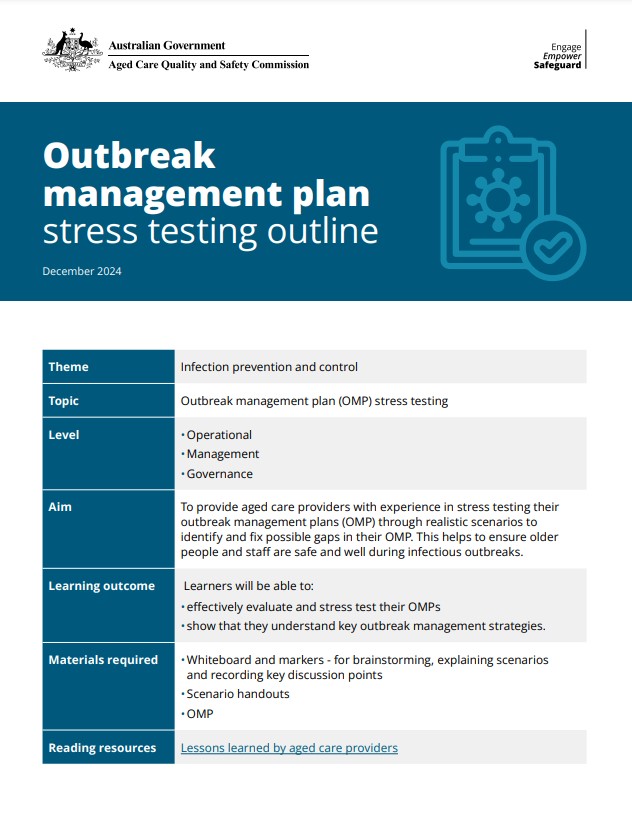
This Regulatory Bulletin explains approved providers’ responsibilities relating to COVID-19 vaccinations and infection prevention and control. It details how the Aged Care Quality and Safety Commission (Commission) is regulating these responsibilities and responding to providers found to be non-compliant.
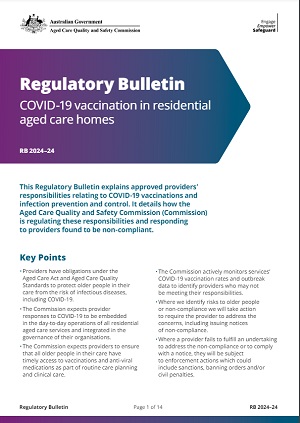
Joint letter on Winter outbreaks to Board Chairs, Residential Aged Care Providers from the Chief Medical Officer, Professor Paul Kelly and Commissioner Janet Anderson PSM.
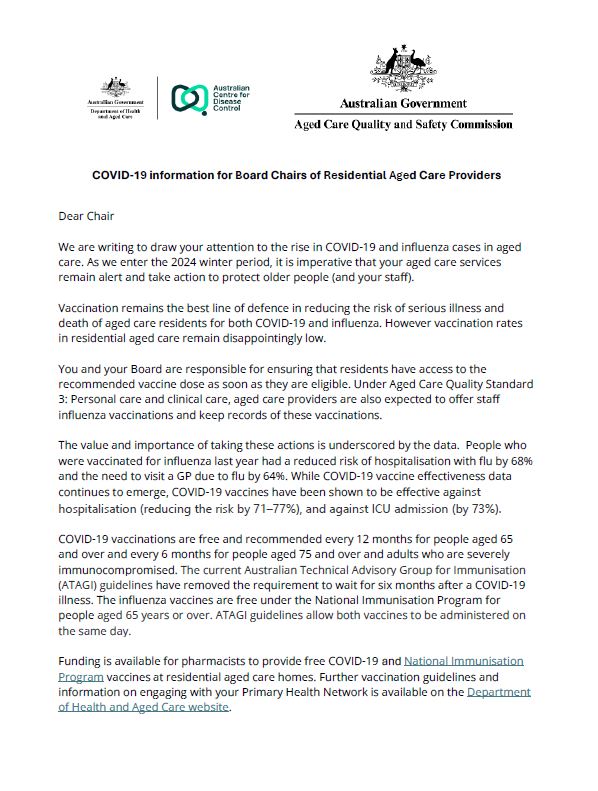
To Dip or Not to Dip (TDONTD) is a quality improvement intervention successfully implemented in UK and Australian aged care homes to improve UTI assessment and antibiotic prescribing appropriateness.
This implementation guide has been drawn from the experiences of homes and champions who have implemented TDONTD, along with feedback from aged care nurses and personal care assistants who have used TDONTD resources.

This quick survey is a reflection tool on urine dipstick practice in your facility.
Is there room for improvement?
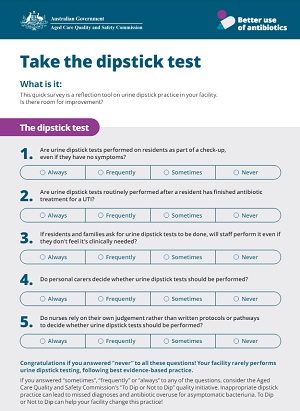
This huddle tool poster provides guidance on appropriate use of urine dipstick tests in older adults. It explains that asymptomatic bacteriuria (ASB) is common and not harmful, but that unnecessary antibiotic treatment can be. It suggests confirming urinary tract infections (UTIs) through clinical symptoms rather than dipstick results.
This resource may refer to information that will be updated from 1 July 2025 to align with the new Aged Care Act and Quality Standards.
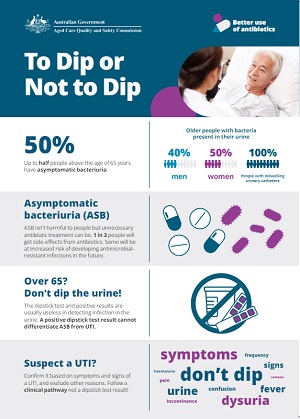
This visual abstract presents outcomes from a quality improvement project aimed at reducing low-value urine dipstick testing in aged care services. It included nurse education, implementing clinical pathways for UTI identification, and evaluating urinalysis practices and antibiotic prescribing. The findings demonstrate improved antibiotic prescribing appropriateness for UTIs over a 6-month follow-up period.
This resource may refer to information that will be updated from 1 July 2025 to align with the new Aged Care Act and Quality Standards.
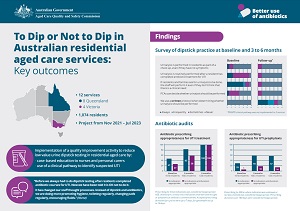
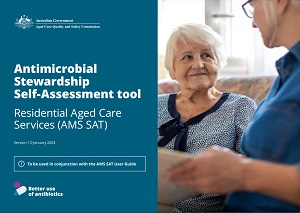
Letter from Commissioner Janet Anderson PSM and Chief Clinical Advisory Dr Melanie Wroth to residential aged care providers and people living in residential aged care homes on the importance of being up to date with COVID-19 vaccine boosters.

This fact sheet includes suggested questions you can ask your provider about how prepared they are for an infectious disease outbreak (including COVID-19). It also includes links to a range of resources to help you feel safe, informed and connected.

Joint letter to approved providers of residential aged care services from the Commission and the Australian Electoral Commission about the 2023 referendum and COVID-19 entry approach for mobile polling staff.

Joint letter from the Aged Care Quality and Safety Commissioner, Janet Anderson PSM and Professor Paul Kelly, Chief Medical Officer to all approved providers of residential aged care services on uptake of the COVID-19 booster.

The Aged Care Quality and Safety Commissioner, Janet Anderson, PSM, together with the Chief Medical Officer, Department of Health and Aged Care, Professor Paul Kelly issued a joint letter to aged care providers to provide advice in preparing a service for the upcoming Easter holiday period and the approaching winter season.

Letter to general practitioners and nurse practitioners to seek support in a quality improvement intervention being undertaken in Australian residential aged care services (RACS), to address overprescribing of antibiotics for aged care residents for urinary tract conditions including asymptomatic bacteriuria.
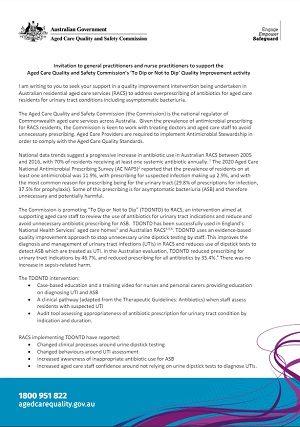
The spread of COVID-19 is increasing across the community and in residential aged care services. Of all the treatment measures available to services, rapid access to oral antivirals could make the biggest difference to consumers if they become infected with COVID-19.

This provider fact sheet helps ensure services are doing everything possible to prevent, prepare for and reduce the impact of a COVID-19 outbreak. It features links to key resources available from the Commission, the Australian Government Department of Health and Aged Care and peak bodies.

The Commission recognises the known physical, psychosocial and nutritional impacts on older people if they experience extended periods of social isolation. This statement outlines what our position is on provider responsibilities relating to visitor access.

On Monday 28 February 2022, the Aged Care Quality and Safety Commissioner, Janet Anderson, PSM, sent a letter to approved providers on the COVID-19 vaccine boosters.
This fact sheet summarises observations by the Commission from engagements with residential aged care services that experienced a COVID-19 outbreak in 2021. It has been informed by our monitoring of more than 350 COVID-19 outbreaks at residential aged care services across several states, and our participation in more than 1,500 outbreak management meetings.








